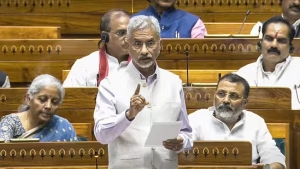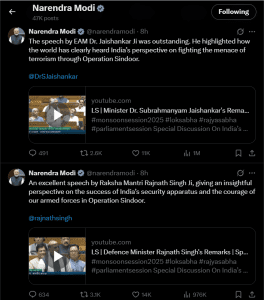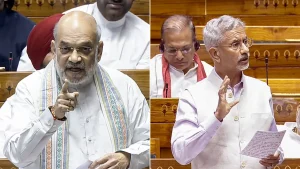New Delhi – The Parliament Monsoon Session Highlights reached a crescendo as Defense Minister Rajnath Singh delivered a powerful opening statement on Operation Sindoor in the Lok Sabha. Singh emphasized that talks and terror cannot coexist, warning Pakistan that Indian strikes would resume if any misadventure occurs. The defense minister revealed that Indian armed forces successfully hit nine terror targets and eliminated over 100 terrorists during the operation.
Singh clarified that crossing borders or capturing territory was never Operation Sindoor’s objective. Instead, the operation focused on achieving specific military and political goals against Pakistan-sponsored terrorism. The Parliament Monsoon Session Highlights demonstrated India’s unwavering commitment to protecting its citizens from cross-border terror attacks.
Strategic Military Response to Pahalgam Attack

Operation Sindoor was launched on May 7 as India’s direct response to the devastating April 22 terror attack in Pahalgam, Jammu and Kashmir, which claimed 26 lives, predominantly tourists. The Parliament Monsoon Session Highlights revealed how Indian forces were given complete freedom to select their targets strategically.
Rajnath Singh disclosed that advanced defense systems, including the S-400 and Akash Missile systems, were deployed during the operation. Despite Pakistan’s non-provocative military posture, the neighboring country launched attacks on India on May 10, prompting a swift and decisive response from Indian forces.
Pakistan’s Desperate Attempts to Stop Indian Operations
The Parliament Monsoon Session Highlights unveiled shocking details about Pakistan’s military leadership reaching out to India during the operation. Singh revealed that Pakistan’s Director General of Military Operations contacted Indian counterparts, desperately requesting cessation of strikes. This unprecedented move demonstrated Pakistan’s inability to withstand sustained military pressure from Indian forces.
Singh emphasized that Pakistan couldn’t maintain combat operations for even 48 hours against the Indian Army. The defense minister challenged opposition members, suggesting they should ask Pakistan about the catastrophic impact of Indian missiles during the operation.
External Affairs Minister Addresses International Dimensions

External Affairs Minister S. Jaishankar’s speech formed another crucial segment of the Parliament Monsoon Session Highlights. Jaishankar specifically addressed questions regarding alleged mediation efforts by US President Donald Trump between India and Pakistan, categorically denying any phone conversations between Prime Minister Modi and the American president during May 9-10.
The external affairs minister highlighted significant achievements in targeting terror infrastructure, specifically mentioning operations in Bahawalpur and Muridke. These locations, previously considered safe havens for terrorist organizations, were successfully neutralized during Operation Sindoor, marking a paradigm shift in India’s anti-terrorism strategy.
Prime Minister’s Commendation and Strategic Vision


Prime Minister Narendra Modi’s praise for both ministers became a highlight of the Parliament Monsoon Session Highlights. Modi specifically commended Rajnath Singh’s insightful perspective on India’s security apparatus and the courage demonstrated by armed forces. The Prime Minister described Singh’s speech as providing comprehensive understanding of military capabilities and strategic thinking.
Regarding Jaishankar’s address, Modi termed it “outstanding” while sharing it on social media platforms. The Prime Minister emphasized how the external affairs minister effectively communicated India’s perspective on combating terrorism through Operation Sindoor to the international community.
Opposition Disruptions and Political Tensions


The Parliament Monsoon Session Highlights were marked by significant opposition disruptions throughout the debate. Home Minister Amit Shah intervened multiple times, criticizing the opposition for disrupting Jaishankar’s crucial address to the nation. These interruptions reflected deep political divisions regarding India’s military response to cross-border terrorism.
Opposition leaders, including Rahul Gandhi and other INDIA bloc representatives, attempted to shift focus toward other issues, particularly the Bihar situation. However, government ministers accused the opposition of avoiding substantive discussion on Operation Sindoor’s success against Pakistani terrorism.
Strategic Implications and Future Deterrence
The Parliament Monsoon Session Highlights demonstrated India’s evolved approach toward handling cross-border terrorism. Union ministers emphasized that the entire nation remained united when confronting Pakistan-sponsored terrorist activities, regardless of political affiliations.
The debate revealed how Indian forces achieved both military and political objectives, leading to the cessation of operations. This strategic approach showcased India’s capability to conduct targeted operations while maintaining international diplomatic relationships.
National Unity Against Terrorism
The Parliament Monsoon Session Highlights underscored broad consensus among political parties regarding national security priorities. Despite procedural disagreements, leaders across party lines acknowledged the necessity of strong responses to terrorist attacks targeting innocent civilians.
The debate emphasized India’s commitment to protecting its citizens while maintaining strategic restraint. The Parliament Monsoon Session Highlights successfully conveyed India’s message that terrorism would face swift and decisive responses, regardless of its source or sponsorship.
Conclusion: Defining Moment in Anti-Terror Policy
The Parliament Monsoon Session Highlights will be remembered as a defining moment in India’s anti-terrorism policy articulation. The comprehensive debate provided citizens with detailed insights into military capabilities, strategic thinking, and political resolve against cross-border terrorism. This session established clear parameters for future responses to Pakistan-sponsored terrorist activities while maintaining India’s commitment to regional stability and international peace.

